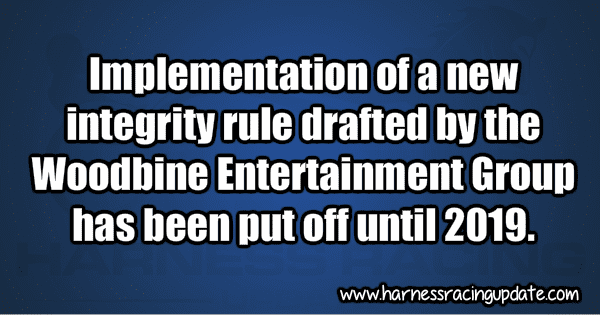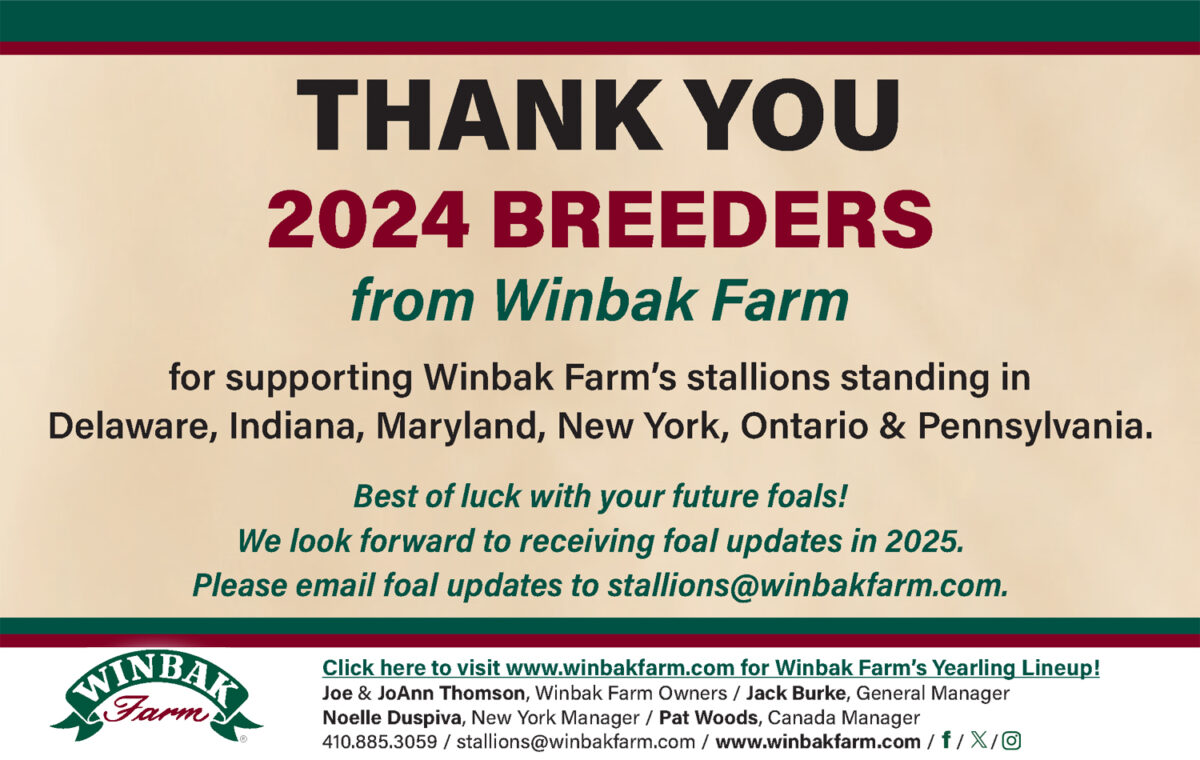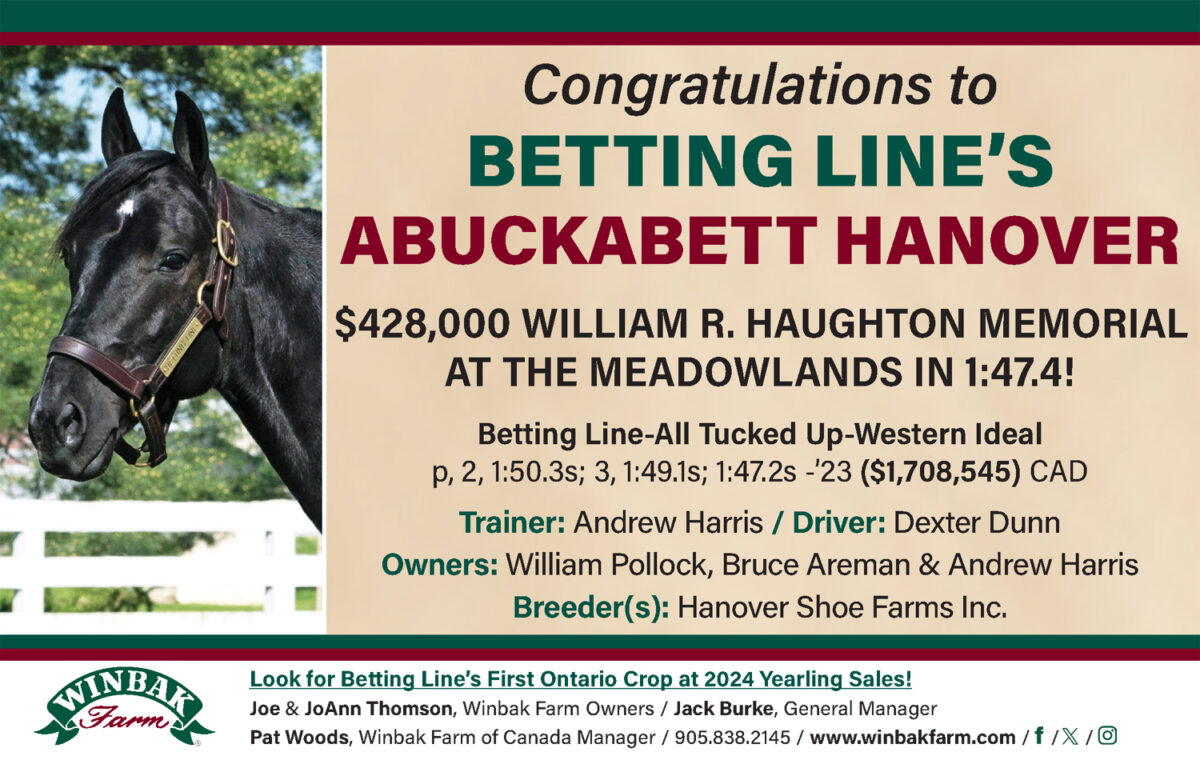

WEG/Gural integrity rule delayed until 2019
With the Feb. 15 stakes payment date looming quickly and Ontario’s regulator requesting more time to vet the rule, the decision has been made to put it off until next year.
by Dave Briggs
Clay Horner told HRU Thursday there are two major reasons the Standardbred Racing Integrity and Accountability Initiative (SRIAI) rule being proposed by the Woodbine Entertainment Group (WEG) and the Jeff Gural owned tracks will not be in effect until 2019. (Read previous stories: 2018-01-07 and 2018-01-12)
Horner, WEG’s chairman, had hoped the new integrity rule intended to increase horse owner accountability would be in place for 2018, but with February 15 stakes payment deadline looming quickly and Ontario’s regulator asking for more time to properly vet the rule, Woodbine at Mohawk Park president Jessica Buckley confirmed the decision has been made to hold off until next year.
“I think it’s going to take more time than we hoped, but we’re definitely not going to back away from what we’re trying to achieve,” Buckley said.
Horner stressed this is not a sign WEG, Gural or the Alcohol and Gaming Commission of Ontario (AGCO) that oversees racing in Ontario is giving up on the rule.
“That would be the wrong message to take away (from the delay in implementation),” Horner said. “There are two messages (to take away): this is highly constructive and we’ll be back.”
The original SRIAI rule announced in early January intended to ban any trainer, horse or owner (with at least a 25 per cent stake in the horse with a positive) from participating in stakes races at Woodbine, Mohawk, the Meadowlands, Tioga Downs and Vernon Downs in 2018 if they have been found by a racing regulatory agency to have tested positive for prohibited substances as defined within the Association of Racing Commissioners International Uniform Classification for Foreign Substances of Class I, II, TCO2 or steroids after Jan. 1, 2018. In the case of Class II positives, owners, trainers and horses would only be subjected to a ban after two Class II positives.
Horner said constructive feedback from the industry caused them to tweak the rule.
“I think the main concern that people had was ‘don’t punish me if I haven’t done anything wrong’ and, of course, that’s a very hard thing to disagree with,” Horner said, “but the trick was coming up with the way to make that happen and still achieve our objectives.”
The tweaked rule was essentially ready to implement this week, Horner said.
“The rule is ready to go. If the AGCO had said yesterday, ‘We’re fine with this. We’ll simply adopt the track rules and you’re fine to go’, then we would’ve released everybody this morning,” he said.
He said the AGCO was consulted on the rule before it was initially released, but became more focused on it once it was officially announced.
Buckley said the AGCO requested more time to study it, meaning implementation needed to be delayed until 2019.
“We were very cognizant of the stakes nomination payment deadline coming up next week and we’re still working through lots of the details with the AGCO, so we felt that we needed to get that message out (that it is being delayed until 2019),” Buckley said.
One positive from working so closely with the AGCO the last few weeks is WEG has, “been able to forge a much stronger partnership with the AGCO and we’ve been having great discussions with them,” Buckley said. That included a meeting Wednesday with AGCO chief executive officer Jean Major.
“(The AGCO was) extremely constructive in terms of indicating their understanding and support for the objectives and the value underlying the rule… and their willingness to work with us actively to get ourselves in a position to come forward with a rule that we all expect to be in effect for 2019,” Horner said.
“(The rule) may require some modification to some of (the AGCO’s) rules to make it work and they indicated that they are open to doing that.”
Horner said he had no regrets about the rule being announced, further announcing it was being tweaked and then failing to get it implemented for 2018.
“Absolutely not,” he said. “Having the dialogue with the industry and hearing from people and listening to people, entirely apart from the rule, has been a fantastic experience. It’s been a very validating experience and something we want to continue going forward. We had to have this debate and hear what people had to say and adjust to it.
“There are a lot of other terrific things that have come out of the last six weeks… but one of them is the extraordinary degree of support within all sectors of the industry for the rule. Even though people didn’t know every element (of the rule), they showed complete support for a rule that required everybody to change somewhat and to take some risks. I think that the two overwhelming positives are that there is a great degree of support in the industry for a rule like this, and the change it requires, and there’s a great, positive relationship with the regulator in terms of working together going forward to make it happen.”
Horner said he wishes he had, “figured out at the outset that we didn’t need to bar a lot of horses from stakes, but rather we could achieve the purpose by categorizing trainers and putting people who used higher risk trainers in greater risk in respect of their ownership interest in the stakes horses… Had I recognized that at the outset, then we probably would have proposed it at the outset, but that’s just the learning curve of trying to do something new and complicated.”
He said he’s proud of the work done to try to curb the use of “beard” trainers — trainers down in name only for banned participants — and believes that work will be reflected in the 2019 rule.
“I think two aspects that are new and important… look at the definition of a beard and how we’re going to categorize beards, and look at the definition of extended ownership groups and trainership groups and realize that where there is a need to group people together as group actors or where there is a need to make sure that truly independent people are taking over trainer responsibilities for horses… The rule drew a pretty broad net in saying that ‘independent’ means truly independent.”
In the meantime, Horner and Buckley said they’ve already seen progress in terms of owners making better choices in trainers ever since the integrity initiative was announced.
“There is a lot of positive momentum around integrity and I think it’s important for all of us. We just want to continue that momentum,” Buckley said.
In the end, Horner said it was a good learning experience.
“I want to thank people for being so generous with their time and for their constructive suggestions. I learned a lot from people about their perspective on this and other important things in the industry related to integrity and other issues,” Horner said. “It’s been a terrific experience. While I personally wish it was going to be in effect for this year, I don’t have a lot of regrets. I think that Rome isn’t built in a day and there’s a lot of good things happening out there that are going to inform where we ultimately get to.”
Burke issued penalty over TCO2
In semi-related news, judges at The Meadows have handed trainer Ron Burke a 30-day suspension and $1,000 fine after TJ Blast — a horse trained and owned, in part, by Burke — had a high blood gas reading (TCO2) prior to the third race on Monday (Jan. 22) at the Pittsburgh-area track.
At the request of the horse’s connections — and in accordance to an authorized procedure offered to others with horses with high TCO2 readings in the past — TJ Blast was sequestered for 72 hours after the initial positive and then retested.
The Pennsylvania State Horse Racing Commission has been told the penalty will likely be appealed, but no such appeal had been filed by Thursday afternoon.















